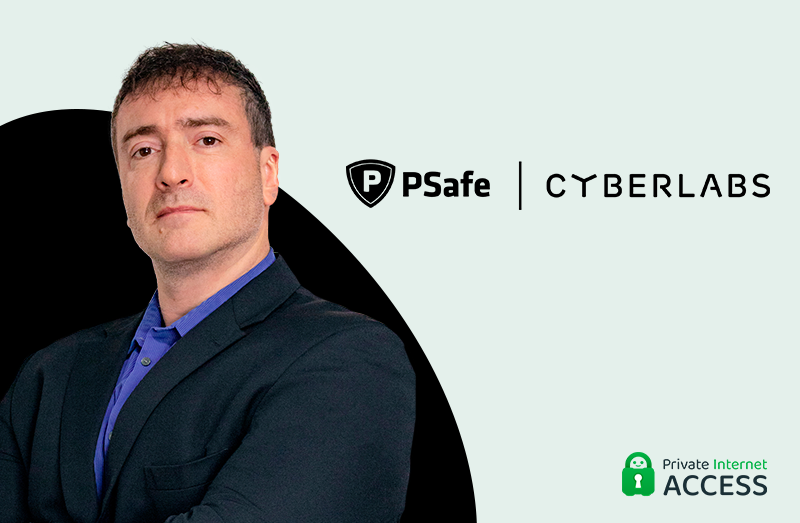Interview With Marco DeMello – PSafe

We recently had the pleasure of interviewing PSafe’s CEO Marco DeMello. We asked him about his company’s dfndr security application and enterprise.
Private Internet Access: What motivated you to start your company?
Marco DeMello: What motivated us, initially, was to create a security solution that would protect mobile users from cyberattacks — and now we’re the largest privately-held cybersecurity company in Latin America.
PSafe was founded in Brazil in 2010 and after a decade in the B2C market, PSafe has more than 300 million installs of its dfndr security application worldwide, establishing ourselves as a leading authority in the field of cybersecurity. Since 2020, we have also grown into the enterprise space when we launched our AI-powered dfdnr enterprise SaaS solution for protecting businesses from modern-day ransomware and zero-day attacks. This turn-key cybersecurity solution will soon enter the US market.
PIA: What do you love about working in cybersecurity?
MD: We have been in the B2B market for two years and I like to say that cybersecurity today is like life insurance for companies. That’s a serious task!
And it’s no different for people, because with increasingly sophisticated cybercrimes, more and more people have fallen victim, even those who have been extremely cautious. Given the growing threat, the passion for working with cybersecurity comes from the desire to protect people and companies from cybercriminals — for us there is an added interest because our solutions are using Artificial Intelligence to be increasingly effective. That’s a domain of security that has always been intriguing to me and it continues to be so.
PIA: What does your company do?/What is your company’s flagship product?
MD: We develop bleeding edge cybersecurity solutions. Currently, we have dfndr enterprise, which is an enterprise solution powered by AI which will also enter the US market later this year. Our consumer solution is dfndr security, which is already present in the US market, protecting mobile devices. Both of our solutions use state-of-the-art technology and are based on AI, which guarantees unparalleled efficiency and effectiveness. With this, we were able to protect both business and consumer devices at the same high levels of detection and mitigation.
We use intelligence based on machine learning and deep learning that can identify and block any threat, including the newest and most sophisticated, in mere fractions of a second. Our AI is powered by a massive database of hacking techniques that is constantly being updated.
Basically, we’re in business to protect people and companies from scammers and cyber criminals!
PIA: Why do individuals and companies need a good VPN?
MD: Consumers and businesses need good, comprehensive preventive solutions, which can include VPN. Today cyberattacks are increasingly sophisticated and this requires a level of protection superior to the attack.
That’s why I say that several layers of protection are necessary, including dfndr enterprise, which we believe it’s the most complete and advanced XDR++ solution on the market, identifying any threat in milliseconds and protecting devices.
The key today is that cybercriminals are constantly using AI in their attacks — so does our solution in users’ defense. It’s the only one on the market capable of performing behavioral and heuristic analysis of threats in real time – and block them instantaneously.
PIA: What are the worst cyberthreats out there today?
MD: Without a doubt, ransomware is the worst threat today, with a worldwide average of 20 attempts per second.
This type of attack also has the potential to be devastating for companies regardless of their profile: small, medium or large, they are all targeted.
This isn’t as well understood as it should be: worldwide, 50 to 70% of ransomware attacks target small and medium-sized businesses, and in 60% of successful attacks, small businesses affected have been forced to close their doors. That’s because the damage goes beyond the rescue, currently costing a world-average of $570,000. The attack can also cause activity stoppage for a period, and loss of information when recovering databases. These kinds of losses can be fatal for many businesses.
PIA: How is the pandemic changing the way your company deals with cybersecurity?
MD: During the pandemic, the internet evolved ten years in six months, it was all extremely fast. This is due to numerous factors, including migration to “home” offices, which required many companies to adapt quickly, enabling employees to do real work from home.
With more and more employees using home networks, often with the factory default Wi-Fi router passwords, cybercriminals found a highly vulnerable path for corporate attacks. I often say that cybercriminals make numerous attempts, but if they get it right just once, a company’s entire system is usually compromised.
So the main challenges today are to fight this new pandemic — of cyberattacks, mainly ransomware — which has caused many companies to falter or even close their doors. That’s a fight we’re very invested in, and we’re here to win it.
